1. Project Introduction
Ocean Protocol is a decentralized data trading platform whose core goal is to solve the problem of user data circulation and value release.
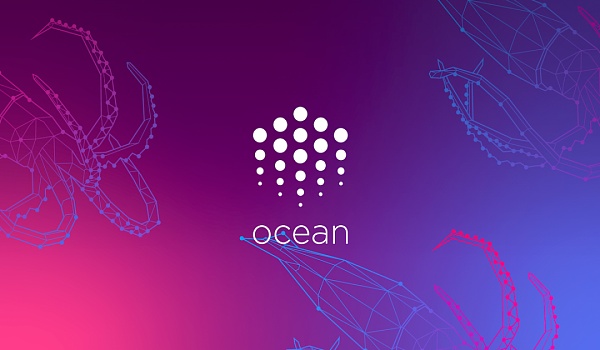
In the current network environment, large companies such as Google and Meta/Facebook make profits by collecting user data, centralizing analysis, and placing advertisements while retaining all profits, while users cannot control where their data goes, let alone gain value from their own data. The emergence of Ocean Protocol aims to change this situation. It makes DataDaos possible by providing users with data ownership and realizing the value of data, that is, making user data truly owned by users and enabling users to profit from it.
So, based on the Ethereum blockchain, Ocean Protocol created its own market to connect data consumers and providers, allowing data providers to monetize their data simply and effectively through the tokenization of data sets and services, while providing users with a one-stop ecosystem for obtaining valuable data.
Currently, Ocean Protocol has issued its own native token, Ocean. This token can be used for data staking, community management, and buying/selling DataToken. It incentivizes the growth of the ecosystem by rewarding data providers and consumers. It is worth noting that the Ocean token is a standard fungible ERC-20 Ethereum token.
2. Core Mechanisms
Ocean Protocol adopts a unique and innovative approach to data sharing and monetization, leveraging blockchain technology to create a decentralized data market. Its core mechanisms revolve around data tokenization, decentralized markets, privacy and control mechanisms, and community governance.
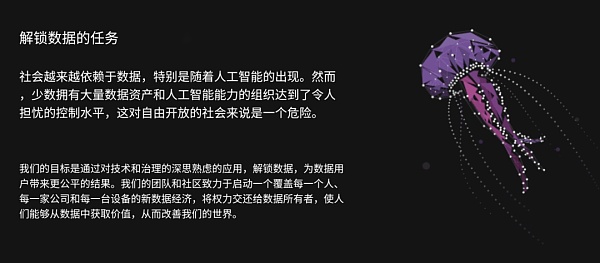
(1)Data Tokenization
Ocean Protocol’s data tokenization is one of its core mechanisms, which aims to convert data into tradable digital assets. This is achieved by creating DataTokens, which are representations of specific datasets, enabling data owners to monetize and share their data while protecting privacy.
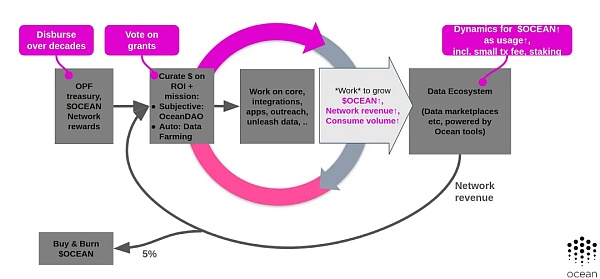
Creating DataTokens: Data providers can tokenize their datasets through Ocean Protocol, creating ERC-20 tokens called DataTokens. These tokens represent access to a specific dataset. Each dataset has its own unique DataToken.
Data Access Control: The tokenization process includes not only generating tokens, but also setting up smart contracts for access rights to the corresponding datasets. This ensures that data access rights can be transferred to token holders in a secure and controllable manner.
Trading and Liquidity:DataTokens allow data owners to list and sell access to their datasets on Ocean Market. Token holders can trade these tokens on the marketplace, or stake OCEAN tokens on specific datasets to provide liquidity.
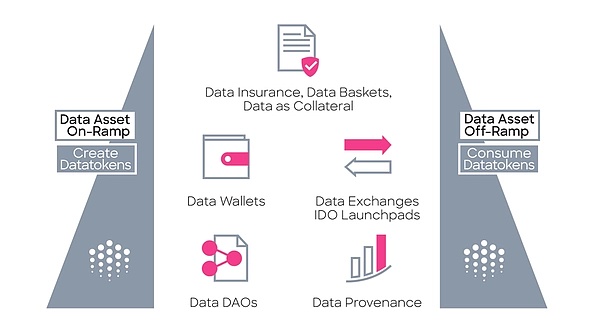
Data Monetization:Data tokenization allows individuals and institutions to turn their data into a revenue stream, profiting directly from their data by selling access to it.
Privacy Protection:Ocean Protocol’s Compute-to-Data feature allows data to be processed and analyzed without disclosing the original data. This means that data providers can share their data without revealing sensitive information.
Market Liquidity:By staking DataTokens and OCEAN tokens on the Ocean Market, liquidity can be provided for datasets, facilitating data transactions and generating returns for liquidity providers.
Decentralized Governance:Ocean Protocol enables community members to participate in the development and management of the protocol through its governance model. The creation and use of DataTokens are jointly determined by the community, which increases the transparency and trust of the platform.
Openness and Scalability:Ocean Protocol provides an open and scalable ecosystem for data providers and consumers, supporting the development of various types of data services and applications.
Dataset Publishing:Data providers first need to describe their datasets clearly and define the number of DataTokens required to access the dataset.
Pricing Mechanism: Data providers can set prices for their DataTokens or use Ocean Market's automated market making mechanism (AMM) to dynamically adjust prices.
Data Access:Consumers gain access to data by purchasing DataTokens. In some cases, access may be time-limited or limited to specific operations on the data.
(2)Decentralized Marketplace (Ocean Market)
Ocean Market is a fundamental component of Ocean Protocol, acting as a decentralized marketplace for data providers and consumers to interact. It leverages blockchain technology to facilitate secure and efficient data exchange.
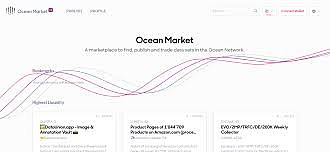
The following is a detailed introduction to how Ocean Market works and its specific features:
Data providers can list their datasets on Ocean Market by tokenizing them into DataTokens. These DataTokens represent access rights to the underlying datasets. When a dataset is tokenized, it effectively becomes a digital asset that can be bought, sold, or traded on Ocean Market. This process not only simplifies the monetization of data, but also ensures that data providers maintain control of their data.
Data consumers, such as developers, researchers, and businesses, can browse Ocean Market to find datasets that meet their needs. Once they have identified relevant datasets, they can use the token OCEAN to purchase the relevant data tokens. Holding DataTokens gives them access to datasets for consumption or analysis, depending on the terms set by the data provider.
Ocean Market employs an automated market maker (AMM) model to facilitate the trading of DataTokens. The model allows for dynamic pricing based on supply and demand, ensuring that data prices are market-driven. Data providers can choose to set a fixed price for their DataTokens or let the market determine the price through an AMM mechanism. This flexibility supports efficient price discovery and liquidity for data assets.
One of the main features of Ocean Market is the Compute Data feature, which allows data to be analyzed or processed without leaving a secure environment. This means that consumers can run algorithms or calculations on the data they access through DataTokens without exposing the raw data. This feature is critical for protecting privacy and security, making Ocean Market attractive for processing sensitive or proprietary data.
Users can stake OCEAN tokens on specific datasets to provide liquidity. This liquidity is critical to facilitating the trading of DataTokens on the market. In return for their contribution, liquidity providers receive a portion of the transaction fees generated from buying and selling DataTokens associated with the datasets they support. This incentivizes the curation of high-quality datasets and the provision of market liquidity.
Ocean Market is governed by the Ocean Protocol community, and OCEAN token holders have a say in the development and direction of the market. This decentralized governance model ensures that the market develops in a way that is consistent with the interests and needs of users.
At its core, Ocean Market aims to democratize access to data, allowing data providers to monetize their assets in a secure environment while giving data consumers easy access to a wide range of datasets. Its blend of blockchain technology, dynamic pricing mechanisms, privacy-preserving features, and community-driven governance make it a cornerstone of the Ocean Protocol ecosystem and a key enabler of the decentralized data economy.
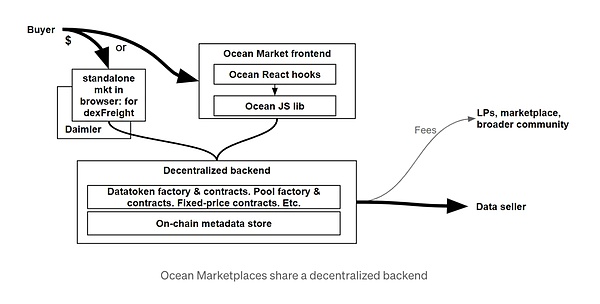
(3) Privacy Control
Ocean Protocol takes an innovative approach to privacy control, especially through its Compute-to-Data feature, which ensures the privacy and security of data while allowing the effective use of data. Ocean Protocol’s privacy control mechanism not only emphasizes the protection of data, but also ensures that data owners have full control over their data. The following is a detailed description of Ocean Protocol's privacy control:
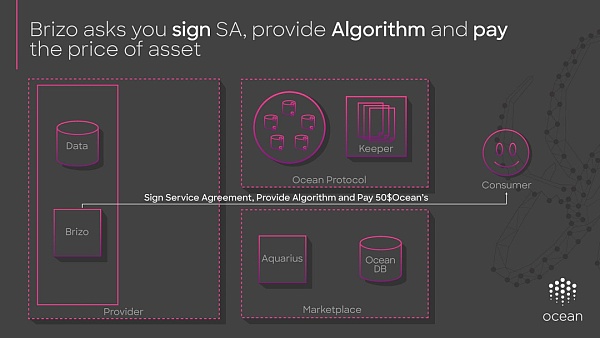
Compute-to-Data is a core feature provided by Ocean Protocol that allows data analysis and computing tasks to be performed where the data is stored while maintaining data privacy. This means that data consumers can perform algorithmic analysis on the data without moving the data to their own servers or other computing environments. How this process works:
Data remains in place:With Compute-to-Data, the original data remains in the secure environment of the data provider and is not directly exposed or transmitted to the data consumer.
Privacy-preserving analysis:Data consumers submit computing tasks to the environment where the data is located. After the calculation is completed, only the results are returned to the consumer, and the original data and its sensitive content will not be leaked.
Authorization control:Data providers can precisely control which users or entities can request calculations and what types of analysis are allowed to be performed, thereby ensuring that the use of data is in line with the wishes and regulations of the data provider.
Ocean Protocol allows for the effective use and monetization of data while protecting data privacy and ensuring data security through Compute-to-Data capabilities and data tokenization mechanisms. This emphasis on privacy and control makes Ocean Protocol an ideal platform for processing sensitive data and promoting data-driven innovation. Through these mechanisms, Ocean Protocol establishes a secure, transparent, and mutually beneficial data exchange environment between data providers and consumers.
3. Ocean Token
Ocean Token (OCEAN) is the native cryptocurrency of the Ocean Protocol platform and plays several key roles to support the operation of the entire ecosystem. As a blockchain project designed to solve the problem of data sharing and monetization, Ocean Protocol provides an incentive mechanism through OCEAN tokens while facilitating data transactions and governance on the platform.
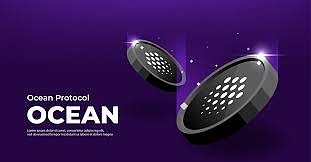
Here are a few key uses and features of the OCEAN token:
Medium of Exchange
OCEAN tokens are used as a medium of purchase for data services and access to datasets on the Ocean marketplace. Data providers gain access to data by tokenizing their data (creating DataTokens), and data consumers can purchase these DataTokens with OCEAN tokens.
Governance
OCEAN token holders participate in the governance process of Ocean Protocol, including voting on key updates, upgrades, and policy changes to the platform. This decentralized governance model ensures that the direction of Ocean Protocol reflects the wishes and best interests of its community.
Staking and Liquidity Provision
In Ocean Protocol, OCEAN tokens can also be used for staking, especially in liquidity provision in data markets. Users can stake OCEAN tokens into specific data asset pools to support the liquidity of data assets. In this way, stakers can receive returns based on their staked amount and related transaction fees.
Value Storage and Investment
Like many cryptocurrencies, OCEAN tokens are also seen as a value storage and investment tool. Investors buy and hold OCEAN tokens, in part, out of confidence in the future development potential of the Ocean Protocol project.
Role in the Data Market and Ecosystem
By providing an economic incentive, OCEAN tokens encourage data providers to share their data and enable data consumers to access this data in a feasible and cost-effective way. In addition, through staking and governance, OCEAN tokens incentivize community members to participate in the maintenance and development of the ecosystem, ensuring the health and activity of the platform.
Total Token Supply: 1,410,000,000, Token Allocation: Founding Team: 20%, Foundation: 51%, Acquirors: 24%, Network Reward: 5%.
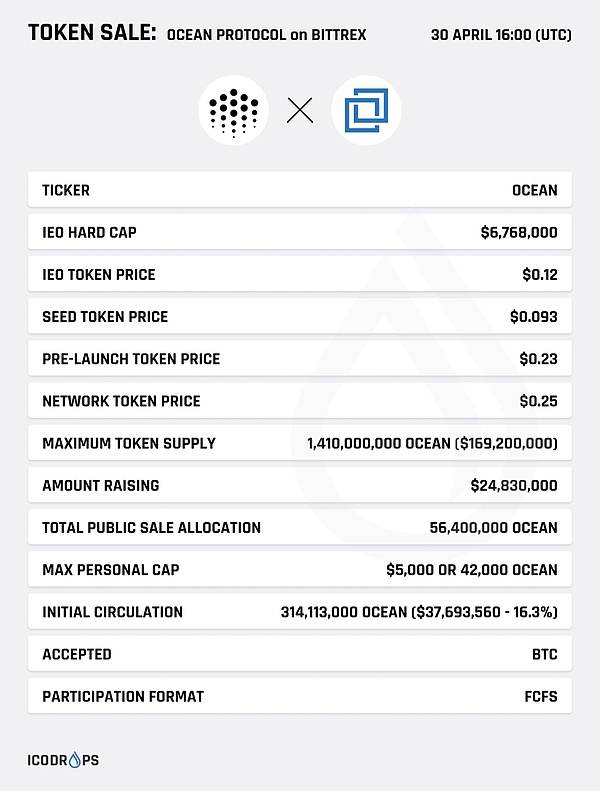
As of now, the current price of OCEAN tokens is $1.20, an increase of 3.33% in the past month. OCEAN's market value is $679,479,935, ranking #130. The number of OCEAN in circulation is 568,381,103, accounting for 40.31% of the total supply. The estimated market value of all OCEAN tokens when they are fully circulated is $1,685,607,326.
4. Team/Funding
Ocean Protocol was founded in Singapore in 2017 by two blockchain entrepreneurs, Bruce Pon and Trent McConaghly. The core team currently consists of 25 blockchain technology experts and entrepreneurs who operate around the world, but most of the team members are in Romania and Germany.
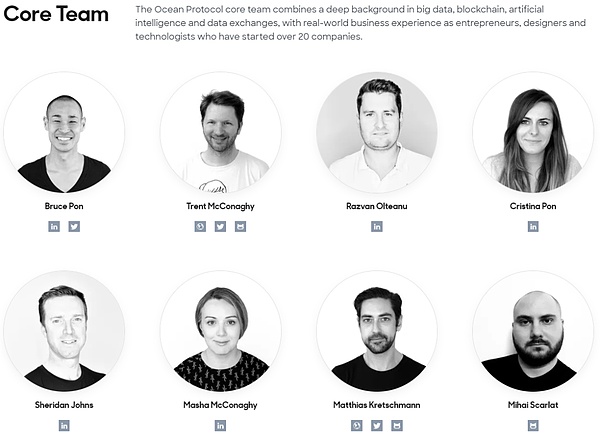
In addition to the dedicated core team working on the protocol, Ocean has more than 20 external advisors who provide guidance on business partnerships and governance. These advisors are also located in multiple countries and are typically CEOs, founders, or heads of C-level functions at technology or analytics companies.
Since its inception, Ocean Protocol has attracted a total of $28 million in venture capital (VC) in 5 rounds of financing. The latest round of financing was a $5 million seed VC round on May 27, 2022. Investors include Blockchain Coinvestors, Caballeros Capital, Cogitent Ventures, Cypher Capital (Dubai), and Deep Ventures (VC), among others.
5. Future Development Analysis
The future development prospects of Ocean Protocol can be analyzed from several different perspectives: technological innovation, market positioning, ecosystem maturity, team capabilities, and financing and token economy.
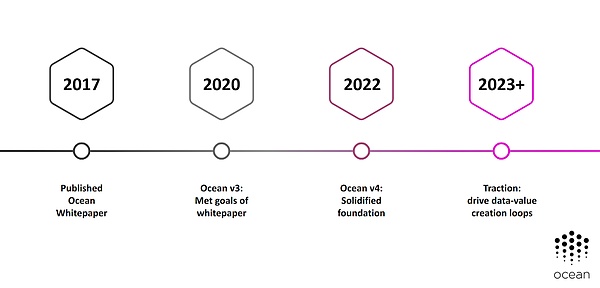
Technological Innovation and Market Demand
Ocean Protocol technically proposes a unique data sharing and monetization model. It solves the contradiction between privacy and availability in the modern data economy, especially in the context of the rapid development of artificial intelligence and big data analysis. The Compute-to-Data feature meets the market need to provide verifiable computation without sacrificing privacy, which is a key factor driving future development.
Ecosystem & Community
Ocean Protocol's ecosystem is growing and includes multiple players from startups to large enterprises. The community governance model and the use of the OCEAN token incentivize broad community participation, which helps promote the long-term vitality and innovation of the platform.
Team & Leadership
Ocean Protocol's team consists of experienced entrepreneurs, blockchain technology experts, and industry consultants who have the ability to successfully drive projects from concept to implementation. The professionalism of the team and the success of the project to date are strong support for its future development.
Funding and Token Economics
Ocean Protocol's funding history shows strong market confidence in its vision and technology. To date, Ocean Protocol has raised funds through initial token offerings and subsequent financing rounds, which provide financial support for its continued technology development and market expansion.
Market Performance
The performance of the OCEAN token in the market shows investors' recognition of Ocean Protocol's future development potential. The market capitalization, circulation, and trading activity of the token are important indicators of its market acceptance and investor sentiment.
Future Challenges
Although Ocean Protocol has shown great potential in many aspects, there are challenges in future development, including:
Market competition: The data market is highly competitive, and Ocean Protocol needs to continue to innovate to stay ahead.
Scaling: In order to achieve wider adoption, Ocean Protocol needs to overcome barriers in technology scaling and user experience.
Regulatory compliance: The use and sharing of data needs to comply with the world's ever-changing privacy regulations and regulatory frameworks.
6. Conclusion
Ocean Protocol’s future development will depend on its ability to continue to drive technological innovation, expand its ecosystem, attract more users and partners, and its ability to adapt to regulatory environment and market changes. Given its strong team background, clear vision and strategy, and initial market results, Ocean Protocol has the potential to become an important player in the data economy. However, its success will also depend on the external market environment, the continuity of technological innovation, and the activity and commitment of the community.
 JinseFinance
JinseFinance


















